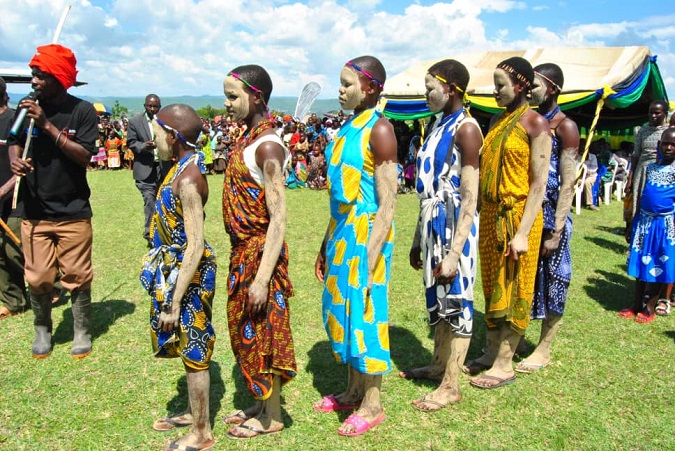Fight against FGM takes centre stage in Tanzania
Date:

One of the traditional elders addresses some of the girls who went through the new initiation that excluded female genital mutilation, in the Borenga community in Serengeti. Photo: AMREF/ Anthony Mayunga
Thanks to the Female Genital Mutilation Elimination (FGM) project (Tokomeza Ukeketaji) supported through the Trust Fund to End Violence Against Women (managed by UN Women), a total of 96 traditional elders and six cutters in Serengeti abandoned the practice in 2018. Instead, they committed to an Alternative Rites of Passage ceremony that managed to protect 634 girls who were supposed to have suffered FGM in the district. This result represents a significant number of elders and cutters in the Serengeti District of the Mara Region in Tanzania who no longer believe the tradition of cutting girls has a role in modern society and as a result, a significant number of girls are now protected.
Gender activists have over the years campaigned against the dehumanizing nature and associated health risks of FGM, a tradition that has seen many girls running for their lives in the affected areas of Tanzania. Earlier in 2018, a total 1,471 girls aged between 9 and 19 in the Serengeti District fled their homes to avoid undergoing FGM, joining other girls who had fled to the same safe house in 2016. The Tokomeza Ukeketaji project worked hard to mobilise traditional elders to see the benefits of protecting girls from the practice and to stop the punishing of community members who condemned it.
UN Women continues to work with partners including the Government of Tanzania, the African Medical and Research Foundation (AMREF), the police, and the Legal Human Rights Centre to mobilise the local communities in the Mara region to end the harmful practice and instead, to invest in the education of their girls. The region has a FGM prevalence rate of 39.9 percent, while among the Kurya tribe alone, it is estimated at 75 percent.
AMREF’s Tokomeza Ukeketaji project manager, Godfrey Matumu, said in previous years, girls between 15 and 19 years were targeted for FGM but with the growing resistance by many girls, the initiation in some areas now starts at the age of nine. He explained the strategy to target traditional elders in all six clans of Inchugu, Inchage, Ngoreme, Tatoga, Walenchoka and Wakenye resulted in key achievements causing the affected communities to stop the practice. “The abhaghaka-bhiikimila (traditional elders) are key decision makers in this practice. The communities here believe that they communicate with the iresa (ancestral spirits), before they approve the cutting which is performed by old women called abhasaari (cutters),” Matumu said.
However, as many brave girls resist the harmful practice, so have many people also come to realise that the myths associated with cutting, which they have believed for many years, also happen to be some of the reasons why their communities have remained under-developed. They now see how through this practice they have also promoted child marriages and deprived their girls of good education and a bright future.